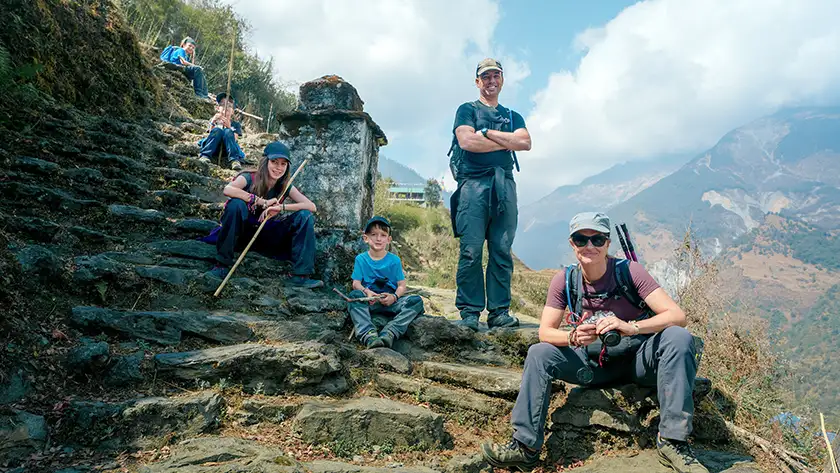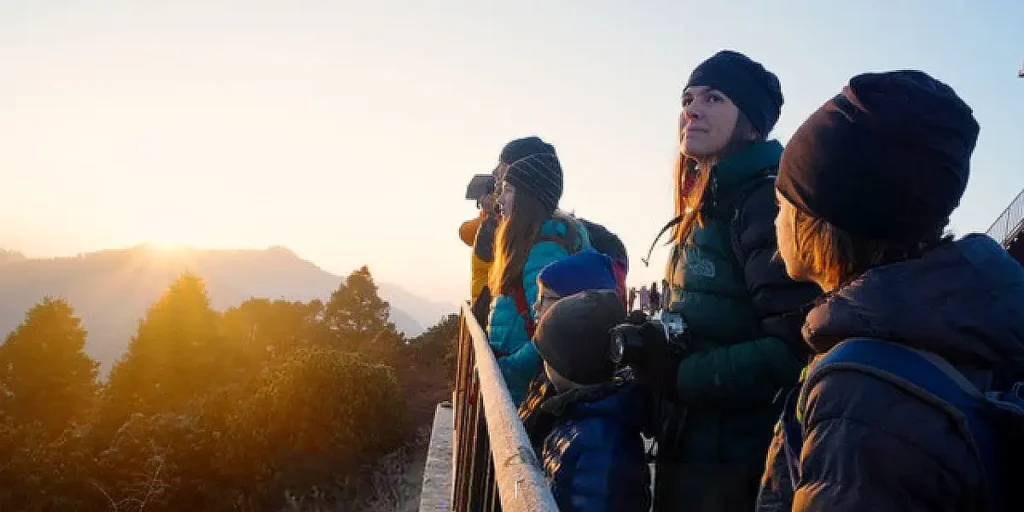A family whose kids are about to go blind decides to see the world in Nat Geo doc Blink (2024), which, perhaps unintentionally, teaches you a valuable lesson.
Directors: Edmund Stenson & Daniel Roher
Genre: Documentary
Run Time: 84′
BFI London Film Festival Screening: October 13-19, 2024
Theatrical Release: October 4, 2024 in select US theaters; November 22, 2024 in UK cinemas
Streaming Release: later in 2024, on Disney Plus
The most valuable lesson I learned from National Geographic documentary Blink (2024), directed by Edmund Stenson (The Martyr) and Daniel Roher (Navalny) came at the end of the movie, when married couple Edith Lemay and Sébastien Pelletier return from a trip around the globe with their four children that was meant to show them as much of the world as possible before three of them go blind. “We were so focused on filling their visual memory that we didn’t see how wonderful it would be to watch them grow and discover the world,” says Edith, as she watches her kids play in the familiarity of environments they know.
The sentence is uttered in passing, as a way to conclude a film that, for most of its runtime, takes the “discovering the world” part literally, showing us the Montreal-based Lemay-Pelletier family‘s adventures around the globe as they cross as many items as possible off their bucket list, from going on a safari and learning how to surf to sleeping on train, eating with chopsticks, and drinking juice on a camel. Yet it was Edith’s line at the end of the film that actually made me really feel something, for the first time since the start of the movie, and got me thinking about something that might not have been what the filmmakers had in mind when they made it. Yes, it’s important for a child to discover the world, though perhaps not quite as literally as this family interpreted it.
The idea of the trip came to Edith and Sébastien when they found out that three of their children – Mia, Colin, and Laurent, respectively 11, 6, and 4 years old – suffered from retinitis pigmentosa, a genetic disease that causes the cells in someone’s eyes to die, and that would soon make them go blind. Feeling helpless, Edith turned to an expert who suggested they fill their kids’s visual memory with images, so they’d know what things looked like in the future, when they’d lose their vision. The expert meant showing them pictures, but Edith and Sébastien, to use their own words, went “all in.” They organized an adventure that would see them visit 24 countries in a one-year long trip that they’d also finance, with a budget of $200 per day. Meaning that, oftentimes, they’d be sleeping in hostels, sharing spaces with strangers, or experiencing discomfort when facing unexpected turns of events.
Sure, most of the items on the bucket list came from the kids themselves, and the places they saw – from Namibia, Mongolia, Indonesia, Thailand, and Nepal to Oman, Egypt, and the Amazon Basin – provided the whole family with plenty of stunning views and once-in-a-lifetime encounters. The documentary is beautifully shot, with a day-in-the-life approach that fully immerses us in these breathtaking views, making us feel as if we were right there with the Lemay-Pelletiers too. And these parent’s effort is admirable, as you can tell they’re really trying to give their children the adventure of a lifetime. Yet, at the same time, one can’t help but feel that, perhaps, the trip was more for the parents than it was for their children.

Edith is the parent who talks the most; once in a while, her voiceover clues us in on her state of mind. It’s from her that we learn how the family found out about retinitis pigmentosa, when they realized that some of the children weren’t able to see the stars at night. She also shares her inability to cope with feeling so out of control, which is partly what gave her the idea to do something for Mia, Colin, and Laurent. Though the trip is definitely therapeutic for Edith – and possibly for Sébastien too, though it’s difficult to get to know him, as we don’t have the same kind of insight into his thoughts – it does feel like a lot to take in for four young children, the youngest of whom, as revealed in a scene of the film, doesn’t even know what it means to go blind.
When the family reaches Ecuador, there’s a scene when they board an aerial cableway that has a malfunction and sees them stuck in it, in the middle of nowhere, freezing and with little water, for over nine hours. The scene is clearly meant to be a metaphor for the children’s condition, as everything goes dark when nighttime comes, in the same way that Mia, Colin, and Laurent will one day stop seeing the world around them. But what struck me the most was the intense discomfort that some of the children experience in a moment that was not only stressful due to the situation itself and what had come before it, including an physically demanding 9-day-hike in the mountains (an item from Sébastien’s bucket list), but also to strangers filming them throughout it all. Even looking at less dramatic scenes, it’s clear that the adventure is not as therapeutic for them as it is for their parents; Léo in particular seems negatively affected by the second half of the trip, where he’s often seen crying and throwing tantrums.
All of this makes Blink quite the contradiction. The film’s official site describes it as a family “setting out on a trip around the world to experience all its beauty while they still can,” and I’m not sure that it’s how I would describe it. It’s a well-intentioned documentary, but it’s too unfocused to really say anything in-depth about the children’s disease and the way they’re processing the news. If anything, the film sends the message across that, once they do go blind, the Lemay-Pelletier kids will not be able to experience the beauty of the world anymore. Especially given how quickly their condition is progressing, I can’t help but feel that at least part of that time could have been spent teaching them how to accept their impending blindness instead, and showing them that there will be other ways to experience the world even then.
Yet, as a travel documentary, the film is very good. You’ll get all the insight you expect from a National Geographic film, with stunning views that will make you want to visit all these places, and enough time with the locals – both humans and animals – to learn about their customs. On top of this, you also get the character study of two parents who try their best to stay positive and ease their own fears as they react to tragic news involving their children. There’s definitely something to be found in Blink; only, it might not be what you expect.
Blink was released in select US theaters on October 4, 2024 and will open in UK cinemas on November 22. The film, which had its UK premiere at the BFI London Film Festival, will be available to stream globally on Disney Plus later this year.

